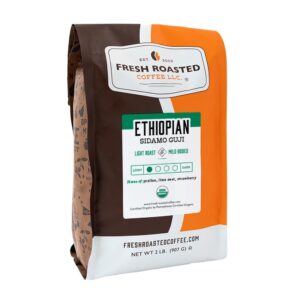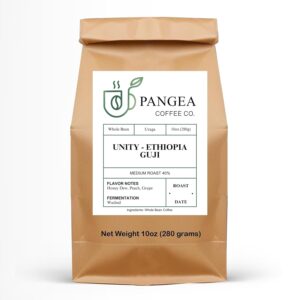Ethiopian Sidamo Guji coffee offers a unique taste experience that captivates coffee enthusiasts worldwide. This light roast, whole bean coffee from the Guji region of Ethiopia provides a flavor profile that sets it apart from other African coffees.
The Guji Zone is known for producing some of the best Ethiopian coffee beans. With its high-altitude growing conditions and rich soil, Guji coffee has a distinctive character that coffee lovers search for.
A Brief History of Ethiopian Sidamo Guji Coffee
Ethiopia is widely regarded as the birthplace of wild coffee, with a coffee-growing tradition dating back centuries. The Sidamo region, including Guji, has been a significant player in Ethiopia’s coffee industry for generations.
In recent years, Guji has gained recognition as a separate coffee-growing area, known for its unique microclimates and processing methods.
The Guji zone, named after the Guji people of the Oromo ethnic group, became an independent region in 2002. This separation from the larger Sidamo area has allowed Guji coffees to develop their own identity in the specialty coffee market.
Comparing Sidamo Guji to Other African Coffees
When it comes to acidity and body, Sidamo Guji coffee stands out among other African coffees. It typically offers a bright, juicy acidity that’s well-balanced and not overpowering.
The body is often described as medium to full, providing a satisfying taste coffee drinkers appreciate.
Sidamo Guji’s flavor profile is characterized by its wine-like, fruity, and chocolatey notes. These characteristics set it apart from other Ethiopian coffees like Yirgacheffe, which is known for its floral and tea-like qualities.
While both are excellent Ethiopian coffee beans, Sidamo Guji tends to have a more robust and complex flavor profile.
Natural vs. Washed Processing
The processing method significantly changes the final taste of Sidamo Guji coffee. Naturally processed Sidamo Guji beans often exhibit pronounced fruity and berry-forward flavors.
This method allows the coffee cherries to dry with the bean inside, adding more of the fruit’s sweetness and complexity to the final product.
Washed Sidamo Guji coffee tends to have a cleaner, more citrusy, and floral profile. The washing process removes the fruit before drying, resulting in a coffee with brighter acidity and higher floral notes.
Roasting Levels change taste
Roast levels play a crucial role in bringing out different aspects of Sidamo Guji coffee:
- Light Roast: Preserves the coffee’s natural acidity and highlights its fruity and floral notes.
- Medium Roast: Balances acidity with body, bringing out more chocolatey flavors while maintaining some fruit notes.
- Dark Roast: Increases body and reduces acidity, emphasizing deeper, roasted flavors but potentially masking some of the coffee’s unique characteristics.
Food and Guji
Sidamo Guji coffee’s flavor profile makes it versatile for food pairings. Its fruity and wine-like notes work well with citrus-based desserts, complementing the bright flavors.
The chocolatey undertones also make it a great match for nutty-flavored foods.
Try this easy dessert that caters to both the above pairings along with your favorite Guji coffee.
Citrus Tart with Nutty Crust
| Ingredients | Instructions |
|---|---|
| 1 1/2 cups mixed nuts (almonds, pecans, walnuts) 1/4 cup sugar 1/4 cup melted butter 4 eggs 1 cup sugar 1/2 cup fresh lemon juice 1/4 cup fresh lime juice Zest of 1 lemon and 1 lime 1/2 cup heavy cream | Preheat oven to 350°F (175°C). Blend nuts, sugar, and butter.Press into a tart pan. Bake crust for 10-12 minutes until golden. Whisk eggs, sugar, juices, and zest in a bowl. Pour mixture into the cooled crust. Bake for 15-20 minutes until set. Cool completely, then chill for at least 2 hours. Whip the cream and spread over the tart before serving. |

Reviewing Different Ethiopian Sidamo Guji Coffees
PureCoffeeCraft is a participant in the Amazon Services LLC Associate Program, an affiliate advertising program designed to provide a means for sites to earn advertising fees by advertising and linking to Amazon. There is no extra cost to consumers for clicking on the following links.
Here is a look at some popular Ethiopian Sidamo Guji coffee options:
Fresh Roasted Coffee, Organic Ethiopian Sidamo Guji
This light roast, whole bean coffee is certified organic and kosher. It offers a right, clean cup with notes of lemon, peach, and jasmine. The light roast preserves the coffee’s natural flavors and acidity.

Pangea Coffee Co. Medium Roast Ethiopian Guji
This medium roast strikes a balance between acidity and body. It’s organic and specialty grade, known for its low acidity and smooth finish.

Expect flavors of berries and chocolate with a hint of floral notes.
Premier Research Labs Organic Whole Roasted Coffee Beans
Sourced from the Guji region, this medium roast is crafted to maximize health benefits. It offers a sweet and fruity profile with a well-balanced taste.
The organic certification confirms no synthetic pesticides or fertilizers were used in its production.

Stumptown Coffee Roasters Ethiopia Guji
Stumptown is known for its high-quality specialty coffees. Their Ethiopia Guji offering is typically a light to medium roast, showcasing the region’s characteristic fruity and floral notes with a hint of bergamot.
Each of these coffees represents the unique qualities of Ethiopian Sidamo Guji coffee, offering coffee enthusiasts a chance to explore the diverse flavors of this renowned coffee-growing region.
The Unique Flavor of Sidamo Guji Coffee
Ethiopian Sidamo Guji coffee stands out for its complex flavor profile and unique growing conditions. The high altitudes of the Guji zone, combined with traditional farming methods, contribute to the coffee’s distinctive taste.
Many coffee experts consider Sidamo Guji to be among the best Ethiopian coffee available.
The natural processing method, commonly used in the Guji region, enhances the coffee’s fruity characteristics. This results in a cup that’s described as having notes of blueberry, blackberry, or other dark fruits.
The wine-like quality of Sidamo Guji coffee is particularly noticable in naturally processed beans.
Sustainability and Ethiopian Coffee Production
Ethiopia’s coffee industry, including the Sidamo Guji region, plays a vital role in the country’s economy. Many farmers in the area practice traditional, organic farming methods, which produce high-quality coffee and contribute to environmental sustainability.
The increasing recognition of Guji as a distinct coffee-growing region has led to better prices for farmers and improved traceability for consumers. This trend towards single-origin coffees has helped highlight the unique characteristics of Sidamo Guji coffee and support local communities.
Frequently Asked Questions
What makes Ethiopian Sidamo Guji coffee unique?
Ethiopian Sidamo Guji coffee is known for its complex flavor profile, featuring bright acidity, fruity notes, and a wine-like quality. The high-altitude growing conditions and traditional processing methods contribute to its distinctive taste.
How should I brew Ethiopian Sidamo Guji coffee?
Pour-over and French press methods are popular choices for brewing Sidamo Guji coffee. Use freshly ground beans, water at 195-205°F (90-96°C), and experiment with ratios to find your preferred taste.
Is Ethiopian Sidamo Guji coffee high in caffeine?
While caffeine content can vary, Ethiopian coffees generally have average caffeine levels. The light to medium roast typical of Sidamo Guji may result in slightly higher caffeine content compared to darker roasts.
Can Ethiopian Sidamo Guji coffee be used for espresso?
Yes, it can be used for espresso, though it’s more commonly enjoyed as a filter coffee. When used for espresso, it often produces a bright, fruity shot with complex acidity.
Sustainability and Ethical Considerations
Many coffee drinkers appreciate the ethical aspects of consuming Ethiopian Sidamo Guji coffee. The region’s coffee industry often supports small-scale farmers who use traditional, organic farming methods.
By choosing coffees from this region, consumers can support sustainable agricultural practices and contribute to the economic well-being of local communities.
Pros
- Complex, unique flavor profile
- Versatile for various brewing methods
- Often ethically sourced and organic
- Supports small-scale farmers
- Excellent for both hot and cold brewing
Cons
- Can be more expensive than commodity coffees
- Flavor profile may be too complex for those preferring simpler tastes
- Requires careful brewing to fully appreciate its nuances
- Limited availability compared to more common coffee varieties
Ethiopia Guji coffee offers a truly exceptional coffee experience. Its complex flavor profile, ranging from bright and fruity to subtly chocolatey, provides a journey of taste with each cup.